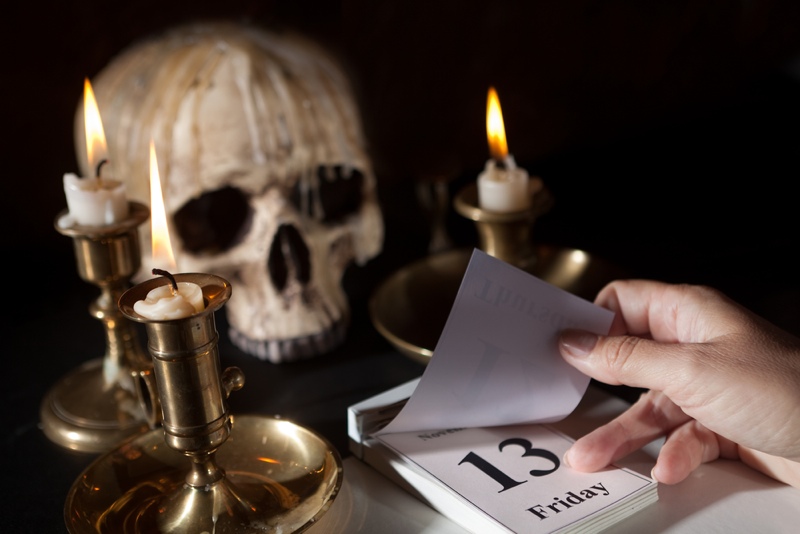Friday the 13th: Why There Are 3 'Unlucky' Days This Year

Get the world’s most fascinating discoveries delivered straight to your inbox.
You are now subscribed
Your newsletter sign-up was successful
Want to add more newsletters?

Delivered Daily
Daily Newsletter
Sign up for the latest discoveries, groundbreaking research and fascinating breakthroughs that impact you and the wider world direct to your inbox.

Once a week
Life's Little Mysteries
Feed your curiosity with an exclusive mystery every week, solved with science and delivered direct to your inbox before it's seen anywhere else.

Once a week
How It Works
Sign up to our free science & technology newsletter for your weekly fix of fascinating articles, quick quizzes, amazing images, and more

Delivered daily
Space.com Newsletter
Breaking space news, the latest updates on rocket launches, skywatching events and more!

Once a month
Watch This Space
Sign up to our monthly entertainment newsletter to keep up with all our coverage of the latest sci-fi and space movies, tv shows, games and books.

Once a week
Night Sky This Week
Discover this week's must-see night sky events, moon phases, and stunning astrophotos. Sign up for our skywatching newsletter and explore the universe with us!
Join the club
Get full access to premium articles, exclusive features and a growing list of member rewards.
It's a bad day to be a triskaidekaphobic, or a person who fears the number 13. And today is a particularly unlucky one for superstitious folk because it's not just Friday the 13th, it's the third Friday the 13th of 2015.
Today's inauspicious (or perhaps completely insignificant) date comes on the heels of a Friday the 13th in both February and March of this year. And that's not all. Today is the third and last Friday the 13th of the year, but it's also the final Friday the 13th in a series of seven years, in which three of those years had three Friday the 13ths.
If you need proof of all these unlucky Fridays, just pull up your calendar. In 2009, there were three Friday the 13th dates. The same was true in 2012 and 2015. So what's with all the fearful Fridays of late? Is it really an unlucky streak, or is there a more rational explanation for this phenomenon? [Find out more about the science behind Friday the 13th]
"This might be disappointing, but the reason is ... that's just the way our calendar works. It all has to do with date patterns in the calendar," Tom Fernsler, an associate policy scientist at the University of Delaware, told Live Science. Fernsler, also known as "Dr. 13," has studied the number 13 for decades.
Get your calendar back up and pull up January 2015. Note that this year, Jan. 1 fell on a Thursday. If you scroll through the months, you'll see that no other month started on a Thursday this year, except for October. January and October have the same date patterns. The same is also true for other pairs of months, and some months have their own unique date patterns that aren't replicated during any other month of the year.
"When a Friday the 13th falls in May (like it will in 2016), June or August, that's the only one you get that year, because no other month of the year has the same date pattern as May, June or August," said Fernsler, who noted that there is always at least one Friday the 13th every year.
On years with two Friday the 13ths, that date falls in a month that has the same date pattern as another month. For example, if there's a Friday the 13th in January, there will be another Friday the 13th in October. The same is true of April and July, as well as September and December.
Get the world’s most fascinating discoveries delivered straight to your inbox.
"The fun comes when you have three Friday the 13ths in one year, like 2015. In most cases when this happens, you have February with a Friday the 13th. February and March have the same date pattern in non-leap years, and March and November always have the same date pattern. So there [are] your three for the year," Fernsler said.
The recent abundance of Friday the 13th dates stems from the fact that, in 2012, Friday the 13th fell on Jan. 13. And 2012 was also a leap year, so the extra day added to the calendar gave April a Friday the 13th, as well. Since April and July have the same date pattern, July also had a Friday the 13th. A similar pattern also occurred in the 1980s.
"Prior to 2009, we saw three Friday the 13ths in three different years in a sequence of seven years during 1981, 1984 and 1987. We'll see the same thing in 2037, 2040 and 2043. In 1984, and again in 2040, January had (and will have) a Friday the 13th in a leap year, which will force April and July to have one, as well," Fernsler said.
But from now until 2040, Friday the 13th will occur three times in one year only once every 11 years. So enjoy this inauspicious Friday, because you won't see another one like it until 2026.
Follow Elizabeth Palermo @techEpalermo. Follow Live Science @livescience, Facebook & Google+. Original article on Live Science.
 Live Science Plus
Live Science Plus










